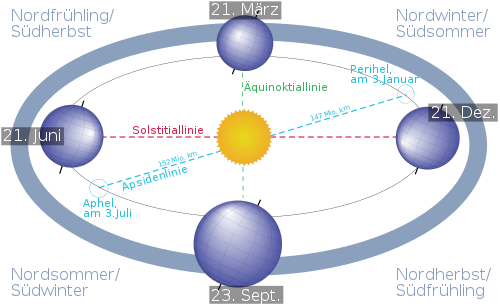spring
The spring or spring , and the spring called, is one of the four seasons and following the winter . In the temperate zones , it is the time of nature awakening and sprouting.
In the course of a year , the length of the day (as the duration of the clear day ) and the day arc of the sun (with the highest midday position of the sun ) change depending on the geographical latitude of a location. On earth, this leads to clearly pronounced seasons in mid-latitudes , which are repeated annually in both hemispheres . While it is autumn in one hemisphere , it is spring in the other; from South Spring of the southern hemisphere is North Spring of Northern Hemisphere distinguished.
Astronomical spring begins with a day and night are equally long (in the northern hemisphere on 20-21 March;. In the southern hemisphere September 22-23.) And ends with astronomical summer solstice (20-21 June in the northern hemisphere. ). Meteorologically, it is usually set for the beginning of March.
Emergence
Period
The beginning of spring can be set in different ways; astronomically this happens according to the position of the earth to the sun, meteorologically mostly according to calendar months and phenologically according to the stages of developing plants , such as their flowering .
Astronomical spring begins with the equinox , a day and night are equally long :
- In the northern hemisphere on March 20 (before 2012 also on March 21, after 2047 also on March 19),
- in the southern hemisphere on September 22nd or 23rd.
With the astronomical beginning of summer at the summer solstice on June 21, spring currently always ends on the same day.
Spring begins meteorologically
- in the northern hemisphere on March 1st,
- in the southern hemisphere on September 1st.
It is (from a meteorological point of view) - like the three other seasons of summer, autumn and winter - exactly three months long and was determined for statistical reasons. However, no expectations of the weather can be derived from these statistical periods, they are each the three calendar months in which summer weather, etc. is most likely to be expected. This classification makes it easier to divide months into “dry”, “hot”, “cold” etc.
Phenologically , spring begins with the first blooming of regionally different plant species.
- In the northern hemisphere, this usually occurs in the months of March , April and May one,
- in the southern hemisphere, on the other hand, in September , October and November .
In Central Europe, the early spring begins with the first blossoms of the snowdrops , but full spring is only reached when the apple trees start to bloom . This period in which nature awakens is also called spring in German usage .
Effect on humans
With the increasing light intensity, more serotonin and dopamine are released . These ensure a generally better feeling of well-being and cause a slight euphoria. The desire for a partner is also stronger for most people in spring, caused among other things by increased hormone secretion . However, this has not been scientifically proven. Presumably, optical stimuli from lighter clothing also play a role. In contrast to these so-called spring feelings, some people feel spring tired. This is mainly attributed to the sleep hormone melatonin , which is still present in the blood , but the exact cause is still unclear.
Others
- Many cultures have spring festivals and rites. For example, various movable church holidays are derived from the date of the beginning of spring . The Persian or Kurdish New Year and the New Year of the Bahá'ís , for example, are celebrated on the Nouruz .
- Many spring flowers - especially bulbous plants - retreat underground after flowering and leave their place to later bloomers. Examples such as violets and primroses are known from the garden .
Spring in literature
Numerous poems and anthologies are dedicated to spring and its peculiarities.
Idioms
- “ Having feelings of spring ” describes an upscale feeling in spring. Colloquially and also jokingly, one means that one feels particularly easily attracted to other people.
- A person experiences “their second spring” who falls in love again - mostly at an advanced age.
reception
-
Eduard Mörike :
It's him ("Spring lets its blue ribbon / fluttering through the air again [...]") -
Theodor Fontane :
“O shake off the heavy dream / and the long winter rest;
the old apple tree dares, hearts, you too dare! " -
Comedian Harmonists :
"Veronika, spring is here, the girls sing tralala ..." -
Antonio Vivaldi :
La Primavera ('The Spring') in Le quattro stagioni ('The Four Seasons') - Spring, summer, autumn, winter ... and spring (film)
- Le sacre du printemps , ballet by Igor Stravinsky
- Primavera (Spring) , painting by Botticelli
- Spring in four seasons , painting by Giuseppe Arcimboldo
See also
- Phenology includes early spring , first spring and full spring
- Spring song
- Spring sky
Web links
Individual evidence
- ↑ SPRING, m. . In: Jacob Grimm , Wilhelm Grimm : German Dictionary . Hirzel, Leipzig 1854–1961 ( woerterbuchnetz.de , University of Trier).
- ↑ LENZ, m. . In: Grimm: German dictionary. Hirzel, Leipzig 1854–1961 ( woerterbuchnetz.de , University of Trier).
- ↑ SPRING, n . In: Grimm: German dictionary. Hirzel, Leipzig 1854–1961 ( woerterbuchnetz.de , University of Trier).
- ↑ Entry spring in duden.online.
- ↑ The sun increases the desire for sex
- ↑ Spring fatigue
- ↑ Spring Fever , compiled by Helen Lenz, with vignettes by Sabine Seliger, Philipp Reclam jun., Stuttgart 2006, ISBN 978-3-15-010591-7
- ↑ And how beautiful is the world , spring poems, with color photogr. by Isolde Ohlbaum , Ed. Matthias Reiner, Insel Verlag Berlin 2014, ISBN 978-3-458-20007-9
- ↑ Spring fever in the digital dictionary of the German language



